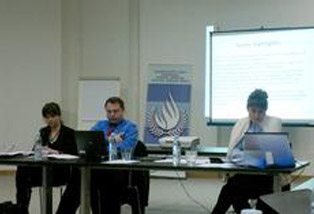Nata Dzvelishvili, media.ge
“We must make the government to joyfully implement the joyfully accepted international recommendations,” Tamar Gurchiani, lawyer of the Georgian Young Lawyers Association said at the meeting held in the Georgian Office of the UN High Commissioner for Human Rights on 27-28 March. Representatives of media and non-governmental organizations participated in the discussion dedicated to the international standards of human rights.
Vladimir Shkolnikov, Senior Human Rights Advisor to the High Commissioner for Human Rights made a speech on the recommendations for Universal Periodic Revision (UPR).
UPR was created on 15 March 2006. With the mechanism the Human Rights Council received a mandate to periodically review the human rights conditions at the territories of UN member countries and issue recommendations. First recommendations were sent to Georgia in 2011; Georgia took responsibility to implement 144 recommendations and declined 17 of them.
European countries are eager to eradicate the problems in freedom of expression and media freedom alongside with other human rights issues in Georgia. For example, the Netherlands recommended Georgia to actively promote freedom of press, including public information availability and to insure relevant investigation of all complaints and lawsuits received on the issue. The government of Georgia accepted this particular recommendation for further implementation.
According to Vladimir Shkolnikov, implementation of recommendations is voluntary and depends on the kind will of each country.
“A country has a right not to accept recommendations, but if it does, they must be fulfilled; this is the issue of international reputation,” Shkolnikov stressed.
On 30 August 2011 Georgian government assumed another obligation with regard to transparent governmental institutions by joining Barack Obama’s initiative – Open Government Partnership. According to Tamar Gurchiani, President Mikheil Saakashvili has promised that by introducing new technologies the government will become more accountable and transparent.
“Still, the government is not fulfilling the main principle of the project – it does not carry out consultations with the society and only three non-governmental bodies are involved in the process, such as Transparency International - Georgia, Georgian Young Lawyers Association and Institute for Development of the Freedom of Information,” Tamar Gurchiani noted. “Civil society must be more active to make the authority to fully meet recommendations and obligations,” she stressed.
Intermediate meeting of the OGP is scheduled to be held in Brazil in several weeks at which Georgia is to present a report on already implemented activities in view of transparency of State bodies.
According to international surveys the situation with availability of public information in GEORGIA is not too grave. For example, Access Info Europe published a survey last year, according to which Georgia is on the second place after New Zealand by means of availability of budgetary information.
According to the Chairman of the Journalistic Ethics Charter Council Zviad Koridze, situation inside the country is different. He presumes that adoption of the Law on Informational Security will significantly limit access to information.
“We also have new amendments in the Law on State Secret. We are facing the situation when Georgia is perceived as a transparent country, while within the country the situation is radically different,” Koridze stressed.




